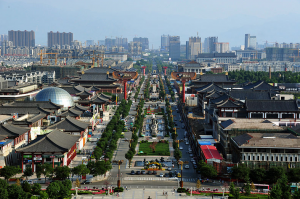
Moving to China for longer than a year? Know what to expect from the health check.
This is the second article in our series looking at the health requirements for moving to certain countries. The first post covered Australia, a reasonably simple country regarding visa health requirements, even a pre-existing condition won’t necessarily mean an application refusal.
For China, an increasingly popular destination for expat assignments and English teachers looking for a challenge, the health requirements are a little more complicated. For anyone going to China to work a health check will be required.
Z-visas
Z-visas cover people working in China, their spouses and dependent children. If you stay longer than one year, a health certificate (Physical Examination Record for Foreigners) will be required.
For applicants from Europe and the United States, even if you have the health checks before you arrive in China you will have to repeat them once you arrive, with the exception of your X-rays if they are fully labelled. However, if the X-rays are older than six months, they may be considered out of date and will be repeated.
The official process is to enter China on a tourist (L-) visa and then your employer has 30 days to start implementing your Z-visa. However, some local Chinese embassies have been known to issue a Z-visa in the knowledge you will have the health check within 30 days of your arrival.
X-visas
X-visas are for students studying in China. If you stay in China for longer than six months you will have to provide a health certificate.
The health check
Your company should organise your health check if you have a Z-visa and it must be done within 30 days of entry into China. Students should check with their university. A Mandarin speaking colleague or friend will be needed to help with paperwork.
When you go for your health check you will need:
- Your passport
- Copies of your visa and the data page of your passport
- Five photos of the specified type (five is to be on the safe side, usually only one or two are needed).
- The fee
Specific requirements may vary from city to city so check in advance if you’re not sure.
During the health test you will be screened for syphilis and HIV. Your blood pressure will be taken, and an EKG performed. You will also have an ultrasound scan of your torso, a chest X-ray, blood taken and standard measurements of height and weight. You teeth and eyesight may also be checked.
Remember the checks are carried out for the benefit of immigration officials, the doctors will not sit down and discuss the results with you. They may not say anything unless you specifically ask.
NB. Do not eat breakfast before your health check appointment.
After the health check
The certificate officially takes around three working days to process, though this can depend on how busy the centre is.
Occasionally you may be called for a re-examination. Don’t panic, this could be due to an unexpected result, or simply a muddle with paperwork. If something unexpected was found, it is likely you will just repeat the related part of the check, if you are asked to repeat the whole process again then it’s probably a paperwork error.
If you are called for a re-examination take all your paperwork from the first checks with you, and your receipt of payment. Many re-tests are concerned with blood-work this is because 99% of Chinese have Rh positive blood, if yours is Rh negative, make sure it is labelled correctly.
Entry refusal on health grounds
The main reasons your visa may be refused on health grounds are if show signs of, or are diagnosed with, psychiatric illness, infectious TB, or other infectious diseases.
In 2010 there was a relaxation in immigration policy which previously prevented people with HIV and leprosy entering the country. Officials now have more leeway when deciding whether to issue a visa on health grounds.
If you worried about applying for a visa or the health check contact your local Chinese embassy who will be able to give you the most up to date regulations.
Image: Chensiyuan